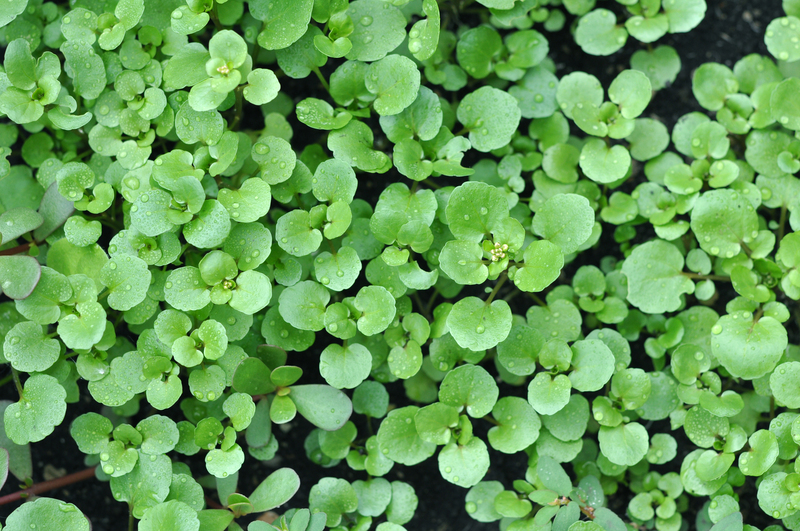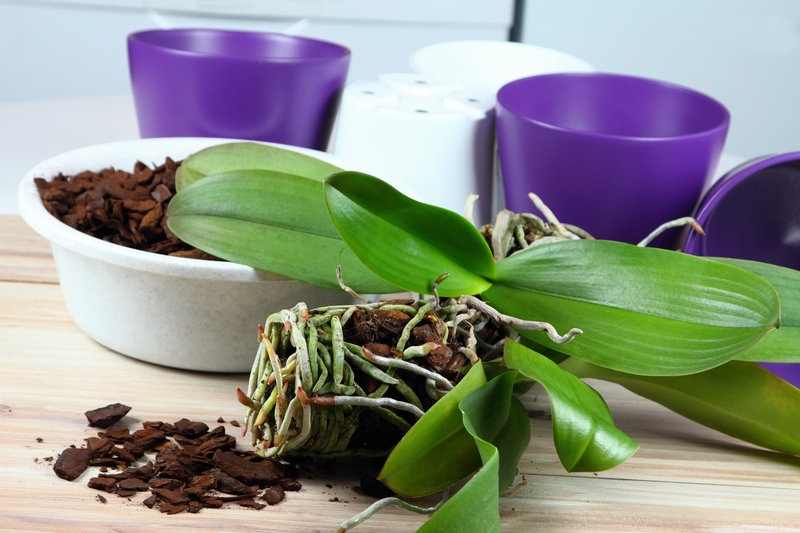From Scraps to Soil: A Journey of Transformation
Posted on 14/08/2025
From Scraps to Soil: A Journey of Transformation
Imagine turning last night's dinner leftovers, vegetable peels, and garden debris into a lush, fertile foundation for tomorrow's plants. The journey from scraps to soil is a compelling tale of transformation, sustainability, and regeneration. This process, known as composting, is not just about reducing waste--it's about giving back to the earth and closing the nutrient loop. Let's embark on an exploration of how kitchen waste and yard clippings become the black gold of the garden: rich, life-giving soil.
Understanding the Transformation: What is Composting?
At its core, composting is a natural, biological process that breaks down organic matter into humus--a dark, crumbly, and nutrient-rich soil. This process relies on the vital work of decomposer organisms, such as bacteria, fungi, worms, and insects, which thrive under the right conditions and speed up the transformation of scraps into soil.
Composting is more than a gardening chore; it is a bridge between humanity's daily habits and the health of our environment. By returning organic waste to the earth, we reduce landfill contributions, lower greenhouse gas emissions, and create a sustainable cycle of renewal.
The Science Behind Turning Scraps into Soil
- Aerobic Decomposition: Oxygen-loving microbes break down organic materials quickly, producing heat, water, and carbon dioxide.
- Carbon:Nitrogen Ratio (C:N): The balance between "browns" (dry leaves, paper, straw) and "greens" (vegetable scraps, coffee grounds, grass) is crucial for efficient composting.
- Moisture and Temperature: Microbes need a moist environment (not soggy) and warmth to thrive, accelerating decomposition.

Why Compost? The Benefits of Organic Waste Transformation
The journey from kitchen scraps to lush soil is paved with environmental, economic, and personal benefits. Here's why composting matters:
- Reduces Landfill Waste: Food and yard scraps account for a significant portion of household waste. Composting diverts this from landfills, reducing harmful methane emissions.
- Enriches Soil: Compost adds essential nutrients and organic matter, improving soil structure, water retention, and fertility.
- Supports Microbial Life: A healthy soil microorganisms' ecosystem helps plants resist diseases and pests naturally.
- Lowers Carbon Footprint: Composting is a carbon-friendly alternative, storing carbon in the soil and decreasing the need for chemical fertilizers.
- Cost Savings: Homemade compost reduces the need for store-bought soil amendments and fertilizers.
Types of Composting: Choosing Your Path from Scraps to Soil
There are several methods to transform scraps into soil, each with unique advantages. Your choice depends on available space, time, and what you wish to compost.
Backyard or Traditional Composting
- Pile or Bin Method: Organic materials are layered in a pile or bin, periodically turned to aerate and speed up decomposition.
- Suitable For: Households with yard space and garden waste.
Vermicomposting
- Worm Composting: Special red wiggler worms consume kitchen scraps, producing nutrient-rich worm castings (vermicompost).
- Ideal For: Urban dwellers or those with limited space, as it can be done indoors.
Bokashi Composting
- Fermentation-Based: Uses anaerobic bacteria to pickle food waste. The process is odorless and can handle meat and dairy scraps--unlike traditional methods.
- Great For: Small spaces, kitchens, and people looking to compost a more extensive range of materials.
How to Start Composting: A Practical Guide
Ready to embark on your own scraps-to-soil journey? Here's a step-by-step guide to ensure transformation success:
1. Choose a Composting Method
Decide whether you'll compost outdoors, with worms, or use the Bokashi method based on your needs and space.
2. Gather Materials
- Browns: Dried leaves, straw, shredded cardboard, newspaper
- Greens: Fruit & vegetable peels, coffee grounds, eggshells, fresh grass clippings
- Never Add: Meat, dairy (except in Bokashi), oils, diseased plants, and pet waste
3. Maintain the Proper Balance
The perfect compost has a 2:1 or 3:1 ratio of browns (carbon-rich) to greens (nitrogen-rich). Too much green? The pile may smell. Too much brown? Decomposition slows down.
4. Manage Moisture and Aeration
The compost pile should feel like a wrung-out sponge--moist but not dripping. Turning the pile every couple of weeks ensures oxygen reaches microbes, speeding up transformation from scraps to nutrient-rich soil.
5. Harvest and Use Your Compost
- Compost is ready when it is dark, crumbly, and smells earthy.
- Use as a topdressing for gardens, mix into potting soil, or spread on your lawn for lush growth.
The Role of Microorganisms in Composting
Bacteria are the primary decomposers, breaking down soft materials quickly. Fungi work on tougher plant fibers, while actinomycetes give compost its characteristic earthy aroma by digesting cellulose and lignin.
Worms and insects further break down and mix compost, ensuring an even transformation from food scraps to rich, lifegiving soil. A healthy compost pile teems with life, echoing the natural cycles found in wild forests and meadows.
Common Composting Challenges and Solutions
Even the best-intentioned composters face obstacles when guiding their waste on the path from scraps to soil. Here's how to address frequent issues:
Odors
- Cause: Too many greens, excess moisture
- Solution: Add browns, turn the pile for better aeration
Pests
- Cause: Improperly added food scraps, like meat or dairy; uncovered compost
- Solution: Only compost recommended materials, cover food scraps with browns
Pile Not Decomposing
- Cause: Lack of moisture, poor C:N ratio, no aeration
- Solution: Moisten pile, adjust ratio, turn regularly
Patience is essential! Composting can take a few months to a year, depending on conditions and method. However, the reward is worth it: all-natural, nutrient-rich soil that will fuel your plants and restore the earth.
Compost and Sustainable Living: Beyond the Garden
The journey from food waste to soil is a critical part of a broader movement. Composting is not just about gardening--it's an actionable step for anyone who values sustainability, environmental health, and resourcefulness.
- Circular Economy: Composting keeps valuable nutrients in the local food system rather than sending them "away" as garbage.
- Climate Action: Reducing organic waste in landfills helps slash methane emissions and supports cleaner communities.
- Education: Composting teaches children (and adults!) about ecology, responsibility, and the interconnectedness of nature.
Innovations in Composting: The Future of Scraps to Soil Transformation
As urban populations swell and the climate crisis intensifies, innovative strategies are emerging to streamline the scraps-to-soil journey. Cities and businesses are deploying:
- Municipal Compost Programs: Curbside pickup and drop-off locations for food waste, turning city-wide scraps into nutrient-rich compost for local parks and farms.
- Compostable Packaging: Increasing availability of compostable plastics and packaging supports "closed-loop" waste management.
- Smart Composters: High-tech machines allow city dwellers to produce compost at home quickly and conveniently without odor or mess.
These advances make it easier than ever to participate in the trasnformation from scraps to cradle-to-cradle soil, regardless of where or how you live.

Making the Journey Personal: How You Can Start Today
The movement from scraps to soil begins at home--with the small, everyday decisions you make about your waste. Here's how you can make a difference:
- Compost at Home: Start a backyard bin or try indoor vermicomposting.
- Join Community Gardens: Many community gardens are eager to receive compost contributions and offer learning opportunities.
- Advocate for Change: Encourage local government and schools to adopt composting and sustainable waste management.
Each banana peel, coffee ground, or carrot top you compost diverts waste from landfills and brings you one step closer to closing the loop--returning nourishment to the earth and sustaining future harvests.
Conclusion: The Endless Cycle of Renewal
The journey from scraps to soil is more than just a series of actions--it's a philosophy of regeneration and hope. By composting, we not only transform waste into a resource but also heal the soil, bolster plant growth, and power our planet's cycles.
The next time you clear your plate or sweep the garden path, envision those scraps as seedlings of renewal, ready for their ultimate transformation. Every bit you compost is a pledge to sustainability, a gift to your garden, and a small act that, when multiplied, can reshape the world.
Let us cherish the humble journey from scraps to soil--a powerful reminder that even the most ordinary remnants can create extraordinary abundance.
Latest Posts
Simplify Your Gardening with Cost-Effective Strategies
Beginner's blueprint to cultivating a sustainable herb garden
Child-Friendly Gardening Tips and Ideas
Cold-Weather Gardening: Prepare Your Plants for Winter's Chill

